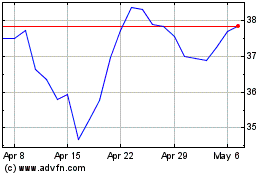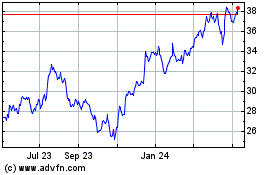Supreme Court to Hear Case on ATM Fees
June 28 2016 - 11:30AM
Dow Jones News
WASHINGTON—The Supreme Court on Tuesday agreed to consider an
appeal by Visa Inc., MasterCard Inc. and several leading banks that
are challenging lawsuits alleging they conspired to set
anticompetitive ATM fees.
The case was one of eight new matters the court added to the
docket for its next term, a move that will help give the court's
upcoming calendar more heft. The court has been operating with
eight members since the February death of Justice Antonin Scalia,
leading to a dynamic where it has been slow to take new cases and
shied away from potential blockbusters.
Other cases added to the docket for the next term, which begins
in October, examine issues including mortgage loans, citizenship
and international law.
The ATM case comes from litigation where consumers and
independent ATM operators, in a 2011 lawsuit, targeted ATM access
fee rules that prevent operators from charging lower fees for
banking transactions processed on networks that cost less than Visa
and MasterCard.
The plaintiffs allege banks including Bank of America Corp.,
J.P. Morgan Chase & Co. and Wells Fargo & Co. agreed to the
ATM restraints when Visa and MasterCard were owned as joint
ventures by the banks. The bank card associations went public in
2008 and 2006, but the plaintiffs say the substance of the
agreed-upon ATM rules remains in place.
A Washington, D.C., appeals court revived the lawsuits last year
after a trial judge previously ruled the allegations weren't strong
enough to proceed. The Supreme Court will review that ruling.
In a separate banking industry case, the high court on Tuesday
agreed to consider whether the city of Miami can bring fair-housing
lawsuits against Bank of America and Wells Fargo. The city alleged
the banks engaged in financial crisis-era discriminatory lending
that forced minority-owned properties into premature or unnecessary
foreclosure.
The city alleged the lending practices led to neighborhood
blight and declining property values, which weakened Miami's tax
base. The banks deny the allegations and say the city's lawsuit was
the brainchild of private plaintiffs' lawyers. They say
fair-housing law doesn't give the city a legal right to bring such
claims.
Elsewhere, the justices also agreed to consider a case in which
an oil-drilling company alleges Venezuela, under the regime of Hugo
Chá vez, illegally seized its property and now uses it for the
country's state-owned business. The high court will consider an
appeal by Venezuela which examines whether a lower court followed
the proper legal rules when it decided that it had jurisdiction to
consider the lawsuit, brought by Helmerich & Payne
International Drilling Co.
The court also agreed to consider the constitutionality of U.S.
rules that determine when to grant citizenship to out-of-wedlock
children born abroad when one of the parents is a U.S. citizen.
Congress has crafted different rules for citizenship in such
circumstances, depending on whether the mother or the father is a
citizen. A New York-based appeals court decided the differing
rules, which make it harder for a father to transmit citizenship,
violated the Constitution's guarantee of equal protection.
The court previously took up the issue in 2011, but split 4-4
thanks to a recusal from Justice Elena Kagan, who had worked on the
case that was then before the court when she served as U.S.
Solicitor General.
Justice Kagan isn't recused in the current case and the justices
will try again to settle the matter, even though they remain
short-handed.
The new case involves a man born in the Dominican Republic whose
father was a U.S. citizen. He was convicted in the U.S. in 1995 for
robbery and attempted murder, and claimed he was a citizen when
federal authorities attempted to deport him.
The court issued its last rulings of the 2015-16 term Monday.
All the new cases accepted for review will be heard in the court's
next term.
Write to Brent Kendall at brent.kendall@wsj.com
(END) Dow Jones Newswires
June 28, 2016 11:15 ET (15:15 GMT)
Copyright (c) 2016 Dow Jones & Company, Inc.
Bank of America (NYSE:BAC)
Historical Stock Chart
From Mar 2024 to Apr 2024

Bank of America (NYSE:BAC)
Historical Stock Chart
From Apr 2023 to Apr 2024
